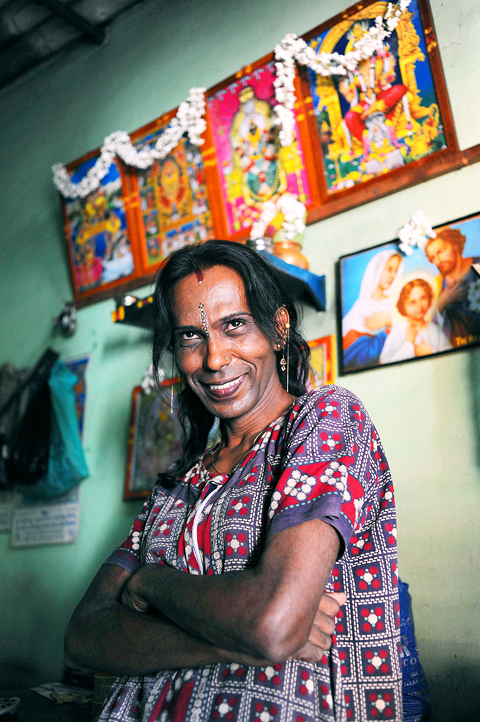India’s 1 million “eunuchs” face a unique dilemma every election season — do they stand in the men’s or women’s line at polling stations or stay away altogether?
In the past, eunuchs — the term used for cross-dressers and pre and post-operative transsexuals known as hijra — have largely abstained from casting their ballots because they are unwilling to identify themselves as male or female on voter registration forms.
While some eunuchs do vote by listing themselves as female, many are pushing for an alternative or “third sex” option on ID cards.

PHOTO: AFP
Laxmi Narayan Tripathi, a prominent eunuch activist and founder of NGO Astitva, which works with sexual minorities, has never voted and refuses to do so until there is a transgender option on ID cards.
“It’s the question of the identity of our whole community,” she said. “In spite of so many years of independence we haven’t got our own identity, our own place in the Constitution of India.”
Most eunuchs live on the outer fringes of society, ostracized and excluded from decent job opportunities and reduced to begging at traffic junctions in major cities or working in the sex trade.
Despite the stigma surrounding them, a campaign to recognize eunuchs as a third sex has yielded some results.
They can now write “E” for eunuch on passports and certain government forms, but poll stations — where they have to identify themselves as male or female — still eludes them.
“There has been quite a bit of progress, so structurally the only thing that comes in is gender politics,” said Ashok Row Kavi, chairman of the Humsafar Trust, a male sexual health non-governmental organization.
Eunuchs who want to contest in elections for greater rights have come up against similar problems, even though several have been elected to public office as women.
Last month, India’s election commission denied three eunuchs in the eastern state of Orissa permission to run as candidates unless they identified themselves as male or female.
The relatively small number of eunuchs, compared with other minority groups, means it is unlikely that any party deems them a priority vote bank, said Anil Bairwal, national coordinator for the Association of Democratic Reforms.
“Whether it will be taken up or not — as far as our political parties are concerned, the only language they understand is the language of numbers,” he said.
Month-long general elections in the world’s largest democracy began on Thursday, with the last of five phases taking place on May 13. Results are expected on May 16.

In the sweltering streets of Jakarta, buskers carry towering, hollow puppets and pass around a bucket for donations. Now, they fear becoming outlaws. City authorities said they would crack down on use of the sacred ondel-ondel puppets, which can stand as tall as a truck, and they are drafting legislation to remove what they view as a street nuisance. Performances featuring the puppets — originally used by Jakarta’s Betawi people to ward off evil spirits — would be allowed only at set events. The ban could leave many ondel-ondel buskers in Jakarta jobless. “I am confused and anxious. I fear getting raided or even

Kemal Ozdemir looked up at the bare peaks of Mount Cilo in Turkey’s Kurdish majority southeast. “There were glaciers 10 years ago,” he recalled under a cloudless sky. A mountain guide for 15 years, Ozdemir then turned toward the torrent carrying dozens of blocks of ice below a slope covered with grass and rocks — a sign of glacier loss being exacerbated by global warming. “You can see that there are quite a few pieces of glacier in the water right now ... the reason why the waterfalls flow lushly actually shows us how fast the ice is melting,” he said.

RISING RACISM: A Japanese group called on China to assure safety in the country, while the Chinese embassy in Tokyo urged action against a ‘surge in xenophobia’ A Japanese woman living in China was attacked and injured by a man in a subway station in Suzhou, China, Japanese media said, hours after two Chinese men were seriously injured in violence in Tokyo. The attacks on Thursday raised concern about xenophobic sentiment in China and Japan that have been blamed for assaults in both countries. It was the third attack involving Japanese living in China since last year. In the two previous cases in China, Chinese authorities have insisted they were isolated incidents. Japanese broadcaster NHK did not identify the woman injured in Suzhou by name, but, citing the Japanese

RESTRUCTURE: Myanmar’s military has ended emergency rule and announced plans for elections in December, but critics said the move aims to entrench junta control Myanmar’s military government announced on Thursday that it was ending the state of emergency declared after it seized power in 2021 and would restructure administrative bodies to prepare for the new election at the end of the year. However, the polls planned for an unspecified date in December face serious obstacles, including a civil war raging over most of the country and pledges by opponents of the military rule to derail the election because they believe it can be neither free nor fair. Under the restructuring, Myanmar’s junta chief Min Aung Hlaing is giving up two posts, but would stay at the